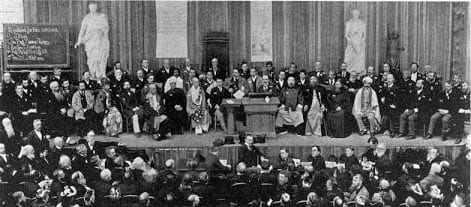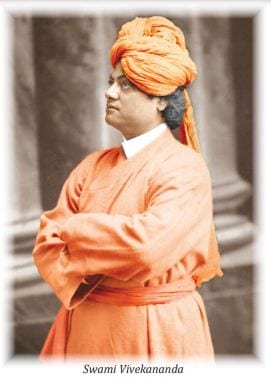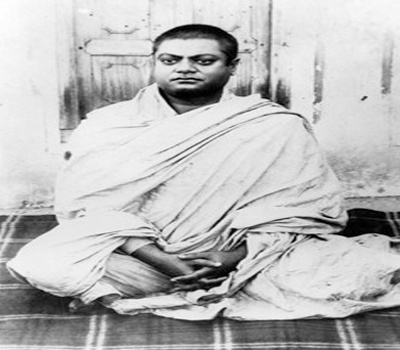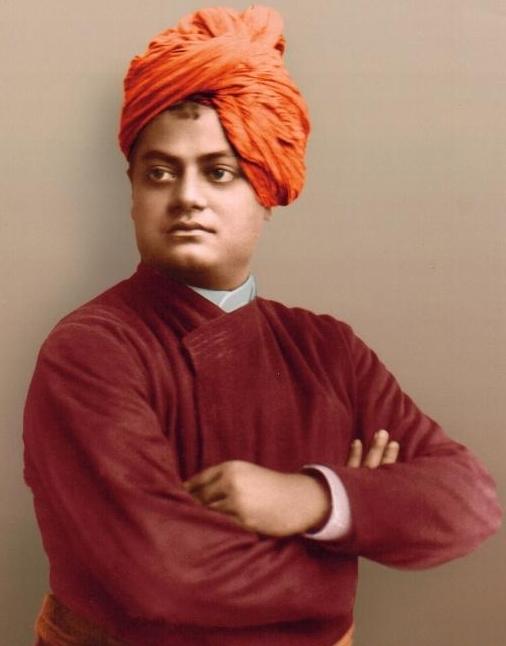EVERYONE HAS A PHILOSOPHY to live by; some of these philosophies are good, others bad. This is so because not all people are correctly aware of what is good for them and for society. This ignorance is due to improper education or guidance. Many do not bother to question but remain content with their situations, however crude or selfish. Again, some of these philosophies may not be workable in modern times and some may be too far-fetched and unattainable.
The majority of people have sense enjoyment as their goal, though they may not admit it! Some do everything to gain position, power, name, fame, and so on because they think these are the greatest things in life. Each type has a set of arguments to justify their doings. In other words, they all have a philosophy of life. However, we are shown by sages and saints the path to express our infinite possibilities and reach a state that is universally valued and respected. The lives of Buddha, Mahavira, Christ, Sri Ramakrishna, and many other great persons have demonstrated this truth.
New Path to Perfection
Great saints and prophets have taught that becoming divine or perfect is the highest goal of human life. All have declared that humankind is heir to immortal life, infinite knowledge, love, and bliss. Though this is very much true according to the Indian ethos, it is also echoed by other great personalities, as Christ says: ‘Be ye therefore perfect, as your Father which is in heaven is perfect.’1
This goal of perfection is attained gradually after realizing the futility of lower goals such as sense enjoyment and socioeconomic power. We see that people once addicted to sensual pleasures become, by middle age, disillusioned and disappointed with those so-called pleasures. Similar is the case with those who run after wealth and power. Therefore, the wise counsel us against the pursuit of temporal goals: ‘Be spiritual; realize that you are divine and you will attain the highest perfection by knowing that you are spiritually immortal, possessing infinite knowledge and bliss.’ They also declare that this goal is achievable and open to everyone. They boldly proclaim that there is no other way to blessedness than consciously choosing and struggling to actualize our real nature. And this spiritual struggle is described in the Upanishads: ‘As difficult as impassable as a razor’s edge,’2 and ‘this Atman is not attained by the weak.’3 This struggle is more adventurous, thrilling, and inspiring than the conquest of external nature.
The latest great personality to show us the path to blessedness is Swami Vivekananda. Guided by his Master Sri Ramakrishna, he traversed this difficult path of discipline and prolonged struggles, and showed us its validity. Swamiji expressed this through a unique philosophy of life that promised us peace and happiness in temporal life, as well as lasting spiritual peace and joy.
Swamiji wanted his monastic brothers to educate the masses of India in secular and spiritual matters. He writes in a famous letter of 1894 from the US to his brother disciples at the Alambazar monastery: ‘I am giving you a new idea. If you can work it out, then I shall know you are men and will be of service. … get together a number of poor, indigent folk … teach them astronomy, geography, etc., and preach Sri Ramakrishna to them.’ 4 Centuries of suppression and exploitation had rendered people helpless. Now, instead of depending on petty rulers and kings or the British to do something, Swamiji wanted the regeneration of India for the people and by the people. He first wanted to eradicate poverty through technical and other secular education, which had to go along with the instilling of spiritual culture, the backbone of India since ancient times.
Swamiji mentions the following special areas of action in the same letter: (i) The need for becoming organized, (ii) electrifying society through one’s character, (iii) having thousands of sannyasins and sannyasinis working selflessly and tirelessly, and (iv) starting centres to spread Sri Ramakrishna’s life and message. He wrote: ‘A huge spiritual tidal wave is coming—he who is low shall become noble, and he who is ignorant shall become the teacher of great scholars—through his grace’ (6.294). And then, in an amazing display of divine inspiration, he concludes:
‘Arise! Awake!’ Great Lord! He is at our back! I cannot write any more—Onward! I only tell you this, that whoever reads this letter will imbibe my spirit! Have faith! Onward! Great Lord! … I feel as if somebody is moving my hand to write this way. Onward! Great Lord! Everyone will be swept away! Take care, he is coming! Whoever will be ready to serve him—no, not him but his children—the poor and the downtrodden, the sinful and afflicted, those who will be ready to serve these, in them he will manifest himself ! Through their tongue the Goddess of Learning Herself will speak and the Divine Mother—the Embodiment of all power, will enthrone Herself in their hearts! (6.295).
Swami Vivekananda speaks about teaching history, geography, astronomy, and modern social sciences in order to awaken the Indian masses. He knew that individual happiness rests on the happiness of others, and awakening people was the first step towards an all-round national development. His ‘new idea’ was far ahead of even the much later communist movements in some parts of the world, which failed because they could not understand the spiritual dimension of the human being. His novel idea was initially not well received by his own brother disciples! But Swami Vivekananda, a born leader, was charting a new path for humanity while spiritually extending the old ideal of ‘
bahujana hitaya bahujana sukhaya; for the good of the many, for the happiness of the many’. In a poignant letter written to the Maharaja of Mysore he says: ‘My noble Prince, this life is short, the vanities of the world are transient, but they alone live who live for others, the rest are more dead than alive’ (4.363). Spiritual life, in the hands of Swamiji, was made proactive and practical through service of the Atman in all.
Swamiji wanted a healthy exchange of ideas between the East and the West. Western technology must be used to uplift the poor masses, and values cherished by the orient for thousands of years taught to the West in exchange. He spoke of mass education going from door to door using the magic lantern, maps, charts, and so on. Today primary education in India, after all these years, is a right and a reality. Unfortunately, the gap between the rich and the poor has not been bridged, but a big start has been made for the poor to rise and stop being exploited. We also need to effectively use all the technological developments such as electronic media, computers, and the Internet to bring the masses into the mainstream. Swamiji was always positive and modern in his approach, and his followers will also have to be so. Distance education can be used to ‘reach the unreached’, even in remote forest and hill tribes and communities.
Spiritual Awakening, the Need of the Hour
Swamiji wanted to eradicate poverty, but he wanted even more the eradication, through spiritual awakening, of selfishness, disunity, jealousy, and corruption, which can happen. These stumbling blocks of human progress could be neutralized by propagating the character, teachings, and religion of Sri Ramakrishna, who preached the divinity of humankind, of the universe, and the harmony of all religions. ‘This’, Swamiji said, ‘is the only spiritual practice, the only worship, this verily is the means, and this the goal’ (6.294).
Swamiji’s call for a national consciousness was unique. In his essay ‘Aryans and Tamilians’, he showed the essential unity of the nation and refuted the Aryan invasion theory. He said that the whole of India was of one race only, called Aryan in the North and Dravidian in the South, both originating from the race that inhabited India from prehistoric times.
Next he wanted to arouse the dormant spiritual consciousness of the nation through the repropagation of moksha, spiritual freedom, and the temporal ideal of intellectual and economic development based on dharma. He wanted everyone to strive for one’s self-realization through service, renunciation, and sacrifice. This path would lead to concentration, meditation, and realization, which the rishis of old attained through years of tapasya, austerities. Therefore, Swamiji exhorted: ‘They had hundreds of Rishis in ancient India. We will have millions—we are going to have, and the sooner every one of you believes in this, the better for India and the better for the world’ (3.284).
In the slavish, slumbering India of the 1890s was it ever possible for 300 million people to rise to become rishis? The same question can be asked of today’s India, with its 1.2 billion people. Swamiji emphatically says: ‘Wherever his [Sri Ramakrishna’s] name will reach, the veriest worm will attain divinity’ (6.294). This rishi-hood, that is, the ideal of an all-round development of the personality, can be attained by keeping before us the fourfold purusharthas, goals of human life: dharma ; artha, wealth; kama; and moksha.
The quest for the purusharthas can transform the powers of the body and the mind into healthy channels of expression, helping thus to reduce distortions arising from selfishness. Let us take up the four goals of life as discussed by Swamiji.
Dharma, Artha, and Kama
Artha and kama are interconnected. Wealth enables one to enjoy pleasures through the senses; pleasures in turn create the need for more wealth. Thus a circle is created of wealth leading to enjoyment, and thirst for more enjoyment leading to more wealth. But the thirst for enjoyment has to be controlled for the following two reasons: (i) The senses have their limitations and therefore overstretching them brings in diseases and premature death; and (ii) sense enjoyment invariably leads to possessiveness and selfishness affecting others’ freedom. Therefore, these clashes and struggles would not be conducive to happiness.
Who is to control this thirst for enjoyments? The individual has to do it through his or her own conscience. There is no other way. Dharma should form the basis for the acquisition of wealth and enjoyment. The modern argument that there is no need for dharma or values in procuring wealth or enjoyment seems absolutely shallow. Besides, one soon learns the harsh truth that wealth and enjoyment destroys oneself. The Bhagavadgita says that God incarnates again and again to guide humanity along the lines of a new dharma to suit a new age. Such an avatara has come again in the form of Sri Ramakrishna. In a glorious tribute to his Master, Swamiji declares: ‘Sri Ramakrishna, the fulfilment of the Indian sages, the sage for the time, one whose teaching is just now, in the present time, most beneficial. And mark the divine power working behind the man. The son of a poor priest, born in an out-of-the-way village unknown and unthought of, today is worshipped literally by thousands in Europe and America, and tomorrow will be worshipped by thousands more. Who knows the plans of the Lord!’ (3.268).
We infer from the above that Swamiji’s ideas regarding the four purusharthas are none other than Sri Ramakrishna’s, which are most relevant to the present age. It is, as it were, Sri Ramakrishna who speaks through Swamiji, who says: ‘This human body is the greatest body in the universe and the human being the greatest being. … Even the Devas (gods) will have to come down again and attain to perfection through a human body’ (1.142). The first duty of a human being is to realize one’s own glorious divine nature. To achieve this one should have faith in oneself and in God. ‘The greatest religion is to be true to your own nature. Have faith in yourselves! If you do not exist, how can God exist, or anybody else?’ (1.483).
We should note that by the above glorification of the human being, Swamiji reiterates that one’s caste is not a barrier for the highest secular or religious achievement. This is also the message of the Mahabharata, which says that neither birth, sacraments, ancestry, or studies make a person dvija, twice-born, but character and conduct alone does. Swamiji describes how we can achieve happiness in this world: ‘Man thinks foolishly that he can make himself happy, and after years of struggle finds out at last that true happiness consists in killing selfishness’ (1.84). This happiness can be at the physical, mental, moral, or spiritual level, the durability and intensity increasing at each succeeding level. This happiness is directly proportional to freedom, and spiritual joy is the highest because it gives freedom.
Food, Education, and Happiness
Food is an important aspect of human happiness. Swamiji advises us: ‘Certain regulations as to food are necessary; we must use that food which brings us the purest mind’ (1.136). But fanaticism regarding choice of food—vegetarian, non-vegetarian, vegan, or ‘veggetarian’—should be eschewed. The food that one is habituated to from one’s childhood should be good for that aspirant, though after an increase of spirituality that too changes accordingly. Swamiji advises that meat eating cannot be outrightly condemned, in the face of the glaring evidence that among the meat eating kshatriyas are the authors of the Upanishads, as well as avataras such as Rama, Krishna, and Buddha. The majority of the followers of all major religions are also meat eaters. ‘Is God a nervous fool like you that the flow of His river of mercy would be dammed up by a piece of meat? If such be He, His value is not a pie!’ (4.359). But Swamiji also declares that for a sannyasin, vegetarian food would be better: ‘To eat meat is surely barbarous and vegetable food is certainly purer—who can deny that? For him surely is a strict vegetarian diet whose one end is to lead solely a spiritual life’ (5.485).
Education plays a vital role in making a person happy. Hence Swamiji often called good education ‘man-making’, because it promoted a person’s all-round growth: physical, intellectual, emotional, moral, and spiritual. He defined education as ‘the manifestation of perfection already in man’ (4.358).
An educated person should develop a strong will power, which comes from the power of knowledge and emotions coming together. This will power should guide one along the right path, to work efficiently, and achieve the maximum with a minimal expenditure of energy. Education should make people good-natured, kind, philanthropic,
and courageous to fight for just causes.
As the whole of creation has issued out of the supreme Soul, and the jiva is a part of this supreme Soul, a person has the knowledge of everything ‘hidden within one’s mind’. Education is ‘uncovering’ this dormant knowledge. This concept of education, as an inside-out manifestation, gives everyone the opportunity and hope to reach very high, provided one struggles hard enough.
Proper education develops an enlightened society in which, necessarily, the majority have to be householders. Swamiji speaks about how men and women can live happily in their families: ‘The householder is the basis, the prop, of the whole society. He is the principal earner. The poor, the weak, the children and the women who do not work—all live upon the householder’ (1.45). He continues: ‘The rule for a householder about the expenditure of his income is, one-fourth of the income for his family, one-fourth for charity, one-fourth to be saved, one-fourth for self ’ (6.114).
A good householder is expected to earn well and spend well. Swamiji calls this a ‘worship’, equivalent to a monastic’s spiritual practices, because behind both is the same virtue of self-surrender and self-sacrifice, prompted by the feeling of devotion to God and to all that is his. Again, the householder has to be a person of character. Swamiji says: ‘Chastity is the first virtue in man or woman’ (1.67). The husband should look upon all other women as his mother, daughter, or sister. The wife has the greater responsibility of bringing back a wayward husband through the power of her love and chastity.
A householder should behave towards his or her family members as a ‘nurse’ in a rich man’s house, believing that all of them are not one’s own but really God’s! A householder, to his enemies, must be a hero; he must resist them and never talk of non-resistance. To his friends and relatives he should be gentle. He should eschew bad habits like gambling, company of the wicked, and soon and struggle to earn a good name. The householder’s life is a training in selflessness, service, sacrifice, and renunciation, to become ‘a sannyasin without a garb’ and quickly attain moksha.
While referring to a householder’s life, we have to look at what ideals Swamiji set for women. ‘To all women every man save her husband should be as her son’ (5.412). Women are by nature religious; if they can preserve this quality and simultaneously develop their intelligence through education, they remain a blessing to any society. Women should not merely be an ornament of the house or look beautiful but develop morality, spirituality, and purity at home and at work. Swamiji always praised the role of women as leaders and as mothers. The great sage Manu spoke of the mother as equal to a thousand teachers.
Swamiji had faith in the women’s role of teaching religion and spiritualizing the world. He wrote to a lady: ‘If bold and talented women like yourself, versed in Vedanta, go to England and preach, I am sure that every year hundreds of men and women will become blessed by adopting the religion of the land of Bharata. … If an Indian woman, in Indian dress preach there the religion which fell from the lips of the Rishis of India—I see a prophetic vision—there will rise a great wave which will inundate the whole of Western world’ (4.485–6).
Importance of Dharma and Moksha
Till now we have seen some of Swamiji’s unique ideas regarding abhyudaya, worldly prosperity. Now let us turn our attention to his unique message for attaining nihshreyasa, highest spirituality. Swamiji’s primary message was to awaken people to their own spiritual glory. ‘No books, no scriptures, no science can ever imagine the glory of the Self that appears as man, the most glorious God that ever was, the only God that ever existed, exists or ever will exist’ (2.250). To manifest this Divinity Swamiji advises: ‘Our first duty is not to hate ourselves, because to advance we must have faith in ourselves first and then in God’ (1.38).
Duty becomes easy if it is in line with our aptitudes. We should select the work we like by nature, to thus serve ourselves and society better. This becomes svadharma, one’s dharma. This can give us great concentration of mind, purity of heart, and finally spiritual enlightenment. Swamiji teaches us that every duty is holy and devotion to duty is the highest form of worship.
We are all born with likes and dislikes and hence certain duties suit our nature whereas others do not. Let us not grumble about others having different works to do. That would rouse envy and kill all kindness in our heart for others. If we remember this, we will love our works and our duties will become sweeter. This is how parents love duties towards their children, husbands duties to their wives, and so on.
Swamiji then teaches that real strength should be both physical and mental. Mental strength lies in the faith of our own Divinity: ‘Men are taught from childhood that they are weak and sinners. Teach them that they are all glorious children of immortality, even those who are the weakest in manifestation. … Say to your own minds, “I am He, I am He”. … That is truth; the infinite strength of the world is yours’ (2.87). This strength is within; it is goodness, it is fearlessness. That is what our Upanishads teach. Swamiji says: ‘The only religion that ought to be taught is the religion of fearlessness’ (3.160).
Doing one’s duties to others by seeing God in them is karma yoga. This makes one thoroughly free from all selfishness. Swamiji considered selflessness as the essence of all goodness. Real ethics is based on the oneness of all creatures. Karma yoga is the path through which by serving others with this idea of oneness, one attains
to spiritual enlightenment by developing complete selflessness.
The antithesis of ‘oneness’ is ‘privilege’. The enjoyment of any advantage over another is called privilege. The aim of morality is its destruction. If one is religious, one cannot claim privileges of any kind. Swamiji also says that good and evil are results of two sets of habits. Hence they can be changed by efforts. Evil is a lesser manifestation of the Atman; good is the Atman more manifested. ‘We should look upon man in the most charitable light. … You are good because you cannot help it. Another is bad because he cannot help it. If you were in his position, who knows what you would have been? …All the thieves, and the murderers, the unjust, the weakest, wickedest, the devils they are all my Christ. I owe a worship to the God Christ and to the demon Christ. … All are my saviours!’ (2.34).
‘This Atman cannot be attained by the weak’say the Upanishads, hence Swamiji exhorts us to have faith in our infinite capacity: ‘All such ideas as we can do this or cannot do that are superstitions. We can do everything. The Vedanta teaches men to have faith in themselves first. … Vedanta says, a man who does not believe in himself is an atheist. Not believing in the glory of our own soul is what the Vedanta calls atheism’ (2.294).
And what becomes of a man after attaining perfection? ‘The Vedanta teaches that Nirvana can be attained here and now, that we do not have to wait for death to reach it’ (5.284). One enjoys infinite bliss and becomes immortal. ‘Salvation means knowing the truth. We do not become anything ; we are what we are. … It is a question of knowledge’ (1.512). ‘It is not that when a man becomes free, he will stop and become a dead lump; but he will be more active than any other being, because every other being acts under compulsion, he alone through freedom’ (5.286).
Knowing God is a deep human necessity. Those that deny this fact have been proved wrong by time. Therefore, so long as there is such a thing as death in the world, there shall be faith in God. ‘The concept of God is a fundamental element in the human constitution. In the Vedanta Sat-chit-ananda (Existence-Knowledge-Bliss) is the highest concept of God possible to the mind’ (1.334).
Swamiji wonderfully argues that all quests for freedom are quests for God, because God is of the nature of absolute freedom! No conception of God can satisfy the soul; it needs realization, and realization needs spiritual practices. What are the spiritual practices Swamiji prescribes for realizing God? ‘Be strong and stand up and seek the God of Love. This is the highest strength. What power is higher than the power of purity? Love and purity govern the world. This love of God cannot be reached by the weak; therefore be not weak physically, mentally, morally or spiritually’ (4.60).
This love of God comes easily by serving God’s creatures. Swamiji says: ‘After so much Tapasya I have understood this as the highest truth: “God is present in every being. There is no other God besides that. He who serves all beings serves God indeed!”’5
God incarnates as a human being so that humans can have direct experience of the existence of God and his love, compassion, and so on. Swamiji testifies this fact for the modern world saying : ‘Higher and nobler than all ordinary ones are another set of teachers, the Avataras of Ishvara, in the world. They can transmit spirituality with a touch, even with a mere wish. The lowest and the most degraded characters become in one second saints at their command. …We cannot see God except through them. We cannot help worshipping them; and indeed they are the only ones whom we are bound to worship .’6 Avataras are like tidal waves of spirituality that inundate the land and reach every home and person. When we understand this principle behind all avataras, we can be liberal and worship all of them. This attitude removes religious fanaticism, which at present is becoming a major source of discord in many societies. In a unique prayer Swamiji says: ‘Our salutations go to all the past Prophets whose teachings and lives we have inherited, whatever might have been their race, clime, or creed. Our salutations go to all Godlike men and women who are working to help humanity, whatever be their birth, colour, or race! Our salutations to those who are coming in the future, the living Gods—to work unselfishly for our descendants!’ (4.153).
Who is the guru? Swamiji speaks about it: ‘The soul can only receive impulses from another soul and from nothing else. … The person from whose soul such impulse comes is called the Guru—the teacher’ (3.45). How to get a real guru? ‘It is a mysterious law of nature that as soon as a field is ready, the seed must and does come; as soon as a soul earnestly desires to have religion, the transmitter of the religious force must and does appear to help the soul’ (3.46).
Swamiji’s ideas are the essence of all Vedantic teachings. He gave them to the modern world in a language that includes the logic of Eastern and Western thinkers. Swamiji exhorted us to be spiritual first and then try to progress in other fields in and through that spirituality. In this he reminds us of the famous shloka of Manu: ‘The knowledge of the Self is stated to be the most excellent among all of them [sciences]; that is the first of all sciences, because immortality is gained through that.’7
We have a unique philosophy of life given by Swami Vivekananda. Let us imbibe his stirring words of strength: ‘“Arise! Awake!” Great Lord! He is at our back! … Have faith! Onward!’
(Source: Prabuddha Bharatha Special Edition January 2014)
References
1. Matthew, 5:48.
2. Katha Upanishad, 1.3.15.
3. Mundaka Upanishad, 3.2.4.
4. The Complete Works of Swami Vivekananda, 9 vols (Calcutta: Advaita Ashrama, 1–8, 1989; 9, 1997), 6.289–90.
5. His Eastern and Western Disciples, The Life of Swami Vivekananda, 2 vols (Kolkata: Advaita Ashrama, 2008), 2.618.
6. Complete Works, 3.53.
7. Manu Smriti, 12.85.
Related







Leave A Comment